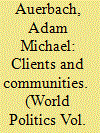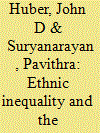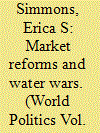|
|
|
Sort Order |
|
|
|
Items / Page
|
|
|
|
|
|
|
| Srl | Item |
| 1 |
ID:
146462


|
|
|
|
|
| Contents |
India’s urban slums exhibit dramatic variation in their levels of infrastructural development and access to public services. Why are some vulnerable communities able to demand and secure development from the state while others fail to? Based on ethnographic fieldwork and original household survey data, the author finds that party networks significantly influence the ability of poor urban communities to organize and demand development. In slums with dense party networks, competition among party workers generates a degree of accountability in local patron-client hierarchies that encourages development. Dense party networks also strengthen organizational capacity and provide settlements with vertical connectivity to politicians and officials. The presence of multiparty networks, however, may attenuate the positive influence of party network density. Interviews with political elites and the survey data suggest that politicians are less likely to provide services to slums with multiparty networks. From within settlements, partisan competition also creates perverse incentives for rival networks to undermine each other’s development efforts. This article contributes to scholarship on clientelism, which has overlooked variation in the density and partisan balance of patron-client networks across poor urban communities and the resulting divergences in democratic responsiveness and development that face those communities. It also contributes to research on distributive politics and the political economy of development.
|
|
|
|
|
|
|
|
|
|
|
|
|
|
|
|
| 2 |
ID:
146463


|
|
|
|
|
| Contents |
Why does ethnicity become a salient element of electoral politics in some places but not others? The authors argue that in majoritarian systems, ethnic identity is most salient to electoral behavior when there are high levels of inequality between ethnic groups. Theytest this argument in the Indian states and find that state-level party system ethnification is strongly correlated with economic inequality between groups, a pattern they also find in cross-national data. Theyalso show that in India, when income differences between groups increase, the groups tend to support different parties. The analysis reveals a strong class component to ethnic politics in India, underscoring the possibility that what scholars often view as identity politics can have an element of class politics in disguise.
|
|
|
|
|
|
|
|
|
|
|
|
|
|
|
|
| 3 |
ID:
146460


|
|
|
|
|
| Contents |
Responses to the imposition of market-oriented economic policies have varied. This article asks two questions: (1) How can we better understand when marketization will or will not prompt resistance? And (2) when people do mobilize, why are some movements broad-based while others draw on particular segments of society? The author argues that these questions can best be answered by focusing not only on the political contexts and resources available to potential social movements, but also on what is perceived to be at stake during marketization. These perceptions influence mobilization processes and the kinds of groups available for mobilization. When people understand markets as threatening to material wellbeing, as well as to widely shared community relationships, understandings, and commitments, heightened feelings of group belonging can contribute to broad-based mobilization. The author develops this argument through analysis of the broad-based, widespread movement that emerged to protest water privatization in Cochabamba, Bolivia, in 1999 and 2000. In the context of a history of agriculture, irrigation, drought, and conflict, water helped to produce and reproduce imagined communities of nation, region, and ethnic group, as well as quotidian communities revolving around the routine production and consumption of water. These meanings help to explain the dynamics of the resistance that emerged.
|
|
|
|
|
|
|
|
|
|
|
|
|
|
|
|
| 4 |
ID:
146459


|
|
|
|
|
| Contents |
How do churches influence public policy and why does their influence vary across similarly religious societies? Prevalent accounts focus on the mobilization of voter demand and coalitions with political parties that offer policy concessions in exchange for electoral support. This article argues, by contrast, that such strategies are both risky and costly, and it demonstrates instead the power of direct institutional access for writing legislation, vetting officials, and even running sectors of the state. Such institutional access is available only to churches with high moral authority: those perceived by the public as representing the common good and the national interest. Churches in Christian democracies have gained such moral authority by defending the nation against a foreign regime, state, or colonial power. In short, churches are most influential when they have the high moral authority to obtain direct institutional access—thus avoiding popular backlash against overt and partisan church politicking.
|
|
|
|
|
|
|
|
|
|
|
|
|
|
|
|
| 5 |
ID:
146461


|
|
|
|
|
| Contents |
This article develops and tests a theory to explain why perceptions of good government performance are a necessary but insufficient condition for the poor to trust their local government. The authors theorize that independent of partisan sympathies, the poor evaluate local government on the basis of government performance and the economic disparities that they observe in their neighborhood of residence. Accordingly, even if the poor hold positive perceptions of government performance, they are less likely to trust their local government when they live in a context of high economic inequality. To test their theory, the authors rely on census, public opinion, and systematic observation data collected within resident-identified neighborhood borders in each of seventy-one neighborhoods sampled from six municipalities in El Salvador. The findings are consistent with the hypotheses and indicate that economic inequality at the neighborhood level may produce a reservoir of distrust in local government among the poor. The results further highlight the political relevance of neighborhoods for the formation of citizen attitudes toward local government in the Latin American context.
|
|
|
|
|
|
|
|
|
|
|
|
|
|
|
|
|
|
|
|
|